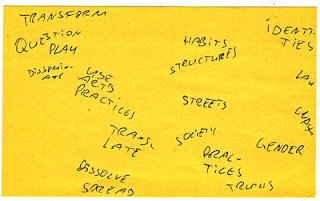Thought I'd add some notes on play and why I find it such an vital way of working/researching and an intriguing subject to be debating. Maybe some food for thought...
Notes, possible themes for discussion:What's the point of playing through/with/as research? (rather than researching play).
How does play relate to 'effecting change' and how is change an imperative for (action) social research?
What are the politics of 'play'? How is this related to motivations to play as research and how is this (is this?) taken seriously as research?
Does play = 'freedom'? [adults play in their 'free-time'; small children and animals can play anytime, unless they're told off for doing so]
When is 'play' sensible and sincere?
The utility of play / taking play seriously (I've written an article that touches on this, I'll post it later)
Does play imply participation / action?
Mischief, deviance, the trickster
Staging, performing, pretending
Trespassing as play - on other disciplines, land, languages - how to create and occupy other (conceptual) places to create 'useful discomfort' (this was a phrase used by Jane Trowell,
Platform recently)
What are the (irrational) rules of play?
Who plays with who? Abuse and manipulation as 'play' - e.g. Abu ghraib (power-relations of tactical play)
Notes on Huizinga:All play is voluntary. Play cannot be denied.
He writes about the secrecy of play (masks, disguises)
Play as relaxation, escapism, instinct
Tension in play (between rules, uncertainty, chance, risk)
'Play to order is no longer play' [what does is mean to be paid to play?]
The 'spoilsport' robs play of its illusion
Play is often considered inferior to serious work - when the contrast between seriousness and play is fluid, according to Huizinga ("The inferiority of play is continually being offset by the corresponding superiority of its seriousness. PLay turns to seriousness and seriousness to play", p.8)
Repetition, order, rhythm and harmony of play
"Play is older than culture, for culture, however inadequately defined, always presupposes human society, and animals have not waited for man to teach them playing. We can safely assert, even, that human civilisation has added no essential feature to the general idea of play. Animals play just like men. We have only to watch dogs to see that ll the essentials of human play are present in their merry gambols." (p.1, Huizinga).
Some references:Johan Huizinga, 'Homo Ludens. A Study of the Play Elements in Culture' (The Beacon Press: Boston, 1950)
Roger Callois, 'Man, Play and Games' (University of Illinois Press: Urbana and Chicago, 1958, 1961, 2001)
Michel de Certeau, 'The Practice of Everyday Life'(1984, trans.)
Nato Thompson and Gregory Sholette (eds.), 'The Interventionists. Users' Manual for the Creative Disruption of Everyday Life' (Mass MoCa: Massachusetts, 2004)
Other current initiatives, practices and research using play in different ways:Probiscis:
http://proboscis.org.uk/"With play and scavenging as two essential ingredients in our work, we manoeuvre between making artworks and inventing communications tools to developing innovative software applications and building environmental sensors to crafting objects and costumes with found materials."
Rebel Clown Army:
http://www.clownarmy.org/"Roll up, roll up - ladies and gentlemen, boys and girls, friends and foes - welcome to the unparalleled, the unexpected, the perfectly paradoxical, the grotesquely beautiful, the new-fangled world of the Clandestine Insurgent Rebel Clown Army (CIRCA)."
Lottie Child's practice:
http://malinky.org/wikka.php?wakka=ComingUp
Download an article about Lottie's Street Training by Tim Gill:
DOWNLOAD FILEKip Jones and performative social science:
http://www.kipworld.net/
Portable Pixel Playground - a playspace developed by folly, the digital arts organisation based in Lancaster, UK - a portable, physical digital art playground which consists of new artists' commissions: so far they have works by Squidsoup and Andy Best & Merja Puustinen. See
http://www.folly.co.uk/ for more information.
To be continued... If you have any suggestions / links to add - post a comment or email sophie[at]welcomebb.org.uk



